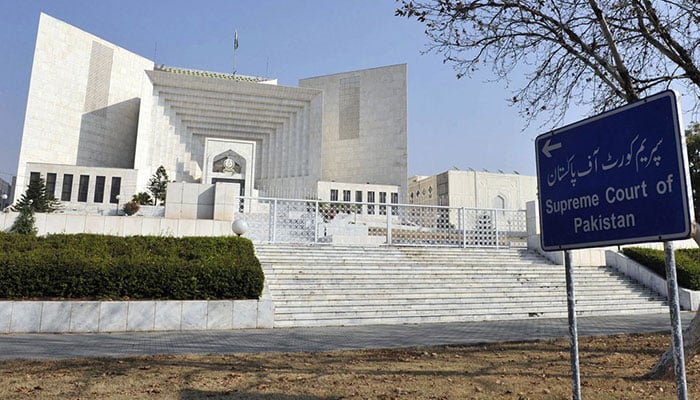Long march to Islamabad: PTI files petition in Supreme Court
We will apprise the court about the threats from the government, says Asad Umar
ISLAMABAD: The PTI on Wednesday filed a petition in the Supreme Court seeking the court’s permission before the announcement of another long march to Islamabad.
PTI Chairman Imran Khan had said that the party will approach the apex court to get assurances that their workers and leaders will not be arrested and the party will be allowed to hold protests in the federal capital.
The PTI chairman made the announcement after he ended the Azadi March abruptly on March 26 and gave a six-day ultimatum to the government to give the election date else he would return with a “sea of people”.
Speaking outside the Supreme Court today, PTI Leader Asad Umar said they have filed a petition and raised nine questions before the top court.
The petition, filed under Article 184(3) of the Constitution, has named the federal government, Islamabad IG Police and all the provinces and their police chiefs as parties.
Asad Umar said that the government launched a crackdown against the party two days before the march. "Police resorted to violence and fired tear gas shells on the protesters."
The caravans coming to Islamabad from Khyber Pakhtwnka were stopped Illegally from entering the federal capital.
"The chief ministers of KP and Gilgit-Baltistan were also not allowed to enter Islamabad."
Asad Umar said that they did not do illegal, attacking institutions is their [PML-N] practice
We will apprise the court about the threats from the government, he said.
Despite the worst government violence, Asad Umar claimed, hundreds of thousands of people came out.
“The government wants to create division between the federation and the provinces,” he alleged.
In its petition, the PTI has pleaded with the court to direct authorities to not torture or arrest or use any force or coercive measures or intimidating tactics, against the citizens of Pakistan and the supporters, workers, members and leaders of the public who want to peacefully hold any protest or assembly announced by it.
It prayed to the court that the federal and provincial governments be ordered to not create any hindrance or obstacle whatsoever, including blocking access to or from any place or city in any manner or from restricting the movement of the people in any manner and through any means.
It also pleaded the top court to issue directives to the government to not use violence including force or any strongarm tactics against any citizen, supporter, worker, member or leader of the party who chooses to participate in the upcoming peaceful assembly.
Questions raised in PTI petition
- Whether freedom of movement, and the right to peaceful protest and procession, is a fundamental right of all the citizens of Pakistan, under the Constitution of the Islamic Republic of Pakistan, 1973 (hereinafter the “Constitution”)?
- Whether constitutional rights, enshrined in Articles 4, 5, 8, 9, 10, 14, 15, 16, 17, 19 and 25 of the Constitution, can be unreasonably curtailed by executive authorities, through the use of disproportionate and unlawful force on the peaceful citizenry?
- Whether the fundamental rights, enshrined in Articles 8, 9, 10, 14, 15, 16, 17, 19 and 25 of the Constitution must be respected and protected from unconstitutional and illegal curtailment by the governmental authorities?
- Whether the State and governmental agencies of Pakistan can unlawfully deprive citizens of their liberty, guaranteed under Articles 9 and 10 of the Constitution, by arresting individuals who are participating in, or intend to participate in, a peaceful protest for the attainment of their democratic rights?
- Whether the governmental agencies can, without any cause or reason, browbeat, intimidate, or physically harm individuals and groups who gather for a peaceful procession, thus violating their ‘inviolable’ dignity and privacy of home, as guaranteed under Article 14 of the Constitution?
- Whether the citizens of Pakistan have the right to peacefully enter, move around and remain in various territories of Pakistan, in accordance with Article 15 of the Constitution?
- Whether the citizens have the right to peacefully assemble, protest and hold demonstrations, for the achievement of their democratic demands, in accordance with the letter and spirit of Article 16 of the Constitution?
- Whether the petitioner, a duly registered political party, has the fundamental right to organize, associate and conduct a nationwide political rally, in accordance with Article 17 of the Constitution, without unlawful interference by the federal and provincial government authorities?
- Whether the arrest and detention of members of the petitioner's political party, prior to or during a peacefully organized protest, amount to illegal detention and arrest, as well as a violation of the Petitioner’s rights under Article 17 of the Constitution?
-
Security forces gun down 30 terrorists in multiple IBOs in KP: ISPR
-
MQM-P calls for new province in Sindh
-
US report validates Pakistan military edge over India: PM
-
Banned TTP poses serious threat to Pakistan security: UNSC panel
-
CM Afridi clarifies remarks on by-poll after ECP requests army deployment
-
Dubai sees 3.2m Pakistani passengers in 2025 as airport sets new milestone
-
Security forces kill 23 Indian proxy terrorists in KP's Kurram
-
Pakistan to construct island to boost oil exploration: report












